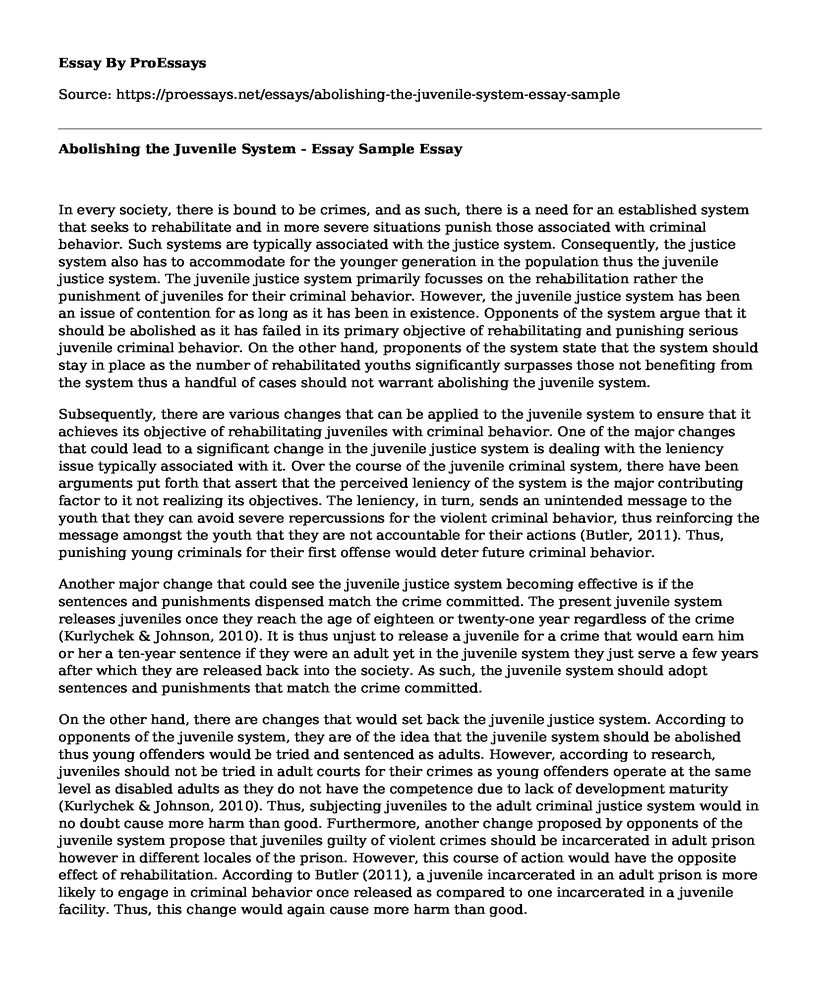In every society, there is bound to be crimes, and as such, there is a need for an established system that seeks to rehabilitate and in more severe situations punish those associated with criminal behavior. Such systems are typically associated with the justice system. Consequently, the justice system also has to accommodate for the younger generation in the population thus the juvenile justice system. The juvenile justice system primarily focusses on the rehabilitation rather the punishment of juveniles for their criminal behavior. However, the juvenile justice system has been an issue of contention for as long as it has been in existence. Opponents of the system argue that it should be abolished as it has failed in its primary objective of rehabilitating and punishing serious juvenile criminal behavior. On the other hand, proponents of the system state that the system should stay in place as the number of rehabilitated youths significantly surpasses those not benefiting from the system thus a handful of cases should not warrant abolishing the juvenile system.
Subsequently, there are various changes that can be applied to the juvenile system to ensure that it achieves its objective of rehabilitating juveniles with criminal behavior. One of the major changes that could lead to a significant change in the juvenile justice system is dealing with the leniency issue typically associated with it. Over the course of the juvenile criminal system, there have been arguments put forth that assert that the perceived leniency of the system is the major contributing factor to it not realizing its objectives. The leniency, in turn, sends an unintended message to the youth that they can avoid severe repercussions for the violent criminal behavior, thus reinforcing the message amongst the youth that they are not accountable for their actions (Butler, 2011). Thus, punishing young criminals for their first offense would deter future criminal behavior.
Another major change that could see the juvenile justice system becoming effective is if the sentences and punishments dispensed match the crime committed. The present juvenile system releases juveniles once they reach the age of eighteen or twenty-one year regardless of the crime (Kurlychek & Johnson, 2010). It is thus unjust to release a juvenile for a crime that would earn him or her a ten-year sentence if they were an adult yet in the juvenile system they just serve a few years after which they are released back into the society. As such, the juvenile system should adopt sentences and punishments that match the crime committed.
On the other hand, there are changes that would set back the juvenile justice system. According to opponents of the juvenile system, they are of the idea that the juvenile system should be abolished thus young offenders would be tried and sentenced as adults. However, according to research, juveniles should not be tried in adult courts for their crimes as young offenders operate at the same level as disabled adults as they do not have the competence due to lack of development maturity (Kurlychek & Johnson, 2010). Thus, subjecting juveniles to the adult criminal justice system would in no doubt cause more harm than good. Furthermore, another change proposed by opponents of the juvenile system propose that juveniles guilty of violent crimes should be incarcerated in adult prison however in different locales of the prison. However, this course of action would have the opposite effect of rehabilitation. According to Butler (2011), a juvenile incarcerated in an adult prison is more likely to engage in criminal behavior once released as compared to one incarcerated in a juvenile facility. Thus, this change would again cause more harm than good.
In conclusion, although the juvenile justice system has its faults, it is still the best option for the rehabilitation of young offenders. Such inadequacies of the juvenile system are easily addressed as most are due to the lack of adequate funds. As such, with enough resources, juveniles do not need to be subjected to adult criminal trials and sentencing thus there is no need to abolish the juvenile justice system.
References
Butler, F. (2011). Rush to Judgment: Prisoners Views of Juvenile Justice. Western Criminology Review 12(3), 106-119.
Kurlychek, M. C., & Johnson, B. D. (2010). Juvenility And Punishment: Sentencing Juveniles In Adult Criminal Court. Criminology 48(3), 725758.
Cite this page
Abolishing the Juvenile System - Essay Sample. (2021, Apr 07). Retrieved from https://proessays.net/essays/abolishing-the-juvenile-system-essay-sample
If you are the original author of this essay and no longer wish to have it published on the ProEssays website, please click below to request its removal:
- Locus of Control as a Contributing Factor to Youth Delinquency and Academic Failure
- Teamwork, Collaboration, Communication, and Knowledge Sharing Paper Example
- The Black Movement - Research Paper
- Murder: The Most Prevalent Crime in the US - Essay Sample
- Essay Example on Feminist Analysis of Gender Concepts: Examining the Concept of a Man
- Selfishness and Happy Marriage: Reasoning and Sharing Ideas for a Family Bond - Essay Sample
- Cuisines That Unite: Exploring the Role of Food in Society - Free Essay Sample







